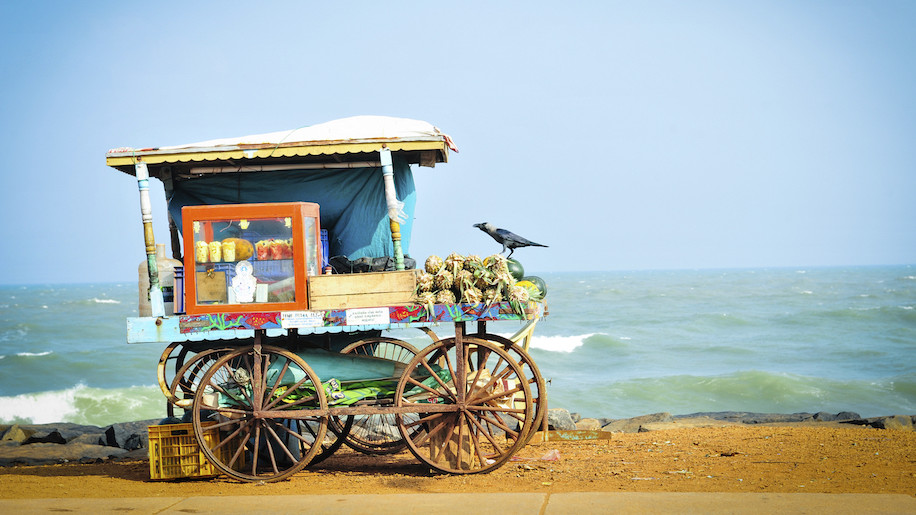Jenny Southan says bonjour to India’s pretty post-colonial town of Pondicherry.
Long and straight, Goubert Avenue runs parallel to the Bay of Bengal. Few cars are in sight, and the adjacent promenade is peaceful. There is not much in the way of a beach, just a strip of orange sand and a steep jumble of rocks tumbling down to the waves. Here and there are palm trees, and a colourful cluster of handcarts selling seashells and fresh fruit have set up in front of a statue of Gandhi.
A man tries to sell me a fishing net, proudly opening it wide with both hands. I try to explain I will have no use for it in London, and move on with a smile to Le Café. With its shaded veranda, it enjoys a prime position facing the water, and serves “not just coffee”. Alongside Indian favourites such as masala chai, lassi and samosa, the hand-painted menu lists French patisseries, quiche and omelettes.
Known affectionately as “Le Pondy” – or Pudecherry if you want to be politically correct – this post-colonial enclave in the south of the country has none of the hassle and noise associated with other Indian cities, and it is immediately evident that its roots are firmly European. French, to be specific. Spend a little time walking around its dusty boulevards and you will hear local Tamils conversing en Français, and spot blue and white street signs with names such as Rue Dupuy and Rue François Martin.
Grand villas with lush gardens are painted turquoise, yellow, terracotta and white, while notable buildings include the Alliance Française, the crumbling Hotel de Ville, the Notre Dame des Anges church, and the pink-washed Pathé Cine Familial theatre. Policemen wear red kepi hats, and Bastille Day and Armistice Day are always celebrated.
It was as late as 1954 that the French left Pondicherry – six years after the end of the British Raj – but it had been fought over for hundreds of years for its value as a trading port. The French lost it four times between 1674 and 1793, before finally securing it in 1815, and when the French East India Company finally departed, many of the locals went with them.
“Pondy was given special status,” explains Ashok Panda from the Indian National Trust for Art and Cultural Heritage (intachpondicherry.org). “The French gave the Tamils here a choice to become French and get a passport, and close to 25,000 accepted and left for France or its colonies. About 40,000 people from the Tamil-French community – first, second and third generation – now live in and around Paris, and they return here sometimes, as expats.”
Pondicherry is also the fictional home of Piscine “Pi” Molitor Patel, protagonist of Yann Martel’s best-selling novel – and Ang Lee’s 2012 blockbuster film – Life of Pi. The opening scenes of the movie were shot in Pondy’s 200-year-old botanical gardens, which were transformed into the Patel family’s zoo after months of planting exotic flowers and shrubs. But if you come looking for its flamingos, sloth and orangutans you won’t find them – these were all filmed in Taiwan.
“I was born and raised in one of the most beautiful places on Earth,” Pi says. And even though many of the old buildings have gently fallen into disrepair, Pondicherry is still a glorious place to visit. Depending on traffic, it is about a 2.5-hour drive from Chennai, and there are numerous sites to take in, from the raucous Grand Bazaar – chock-full of seafood, vegetables and strings of jasmine flowers – to the Sri Manakula Vinayagar temple, where you can receive a blessing from an elephant.
While there aren’t any well-known hotel brands, there are several boutique properties – the 18th-century Hotel de L’Orient serves excellent creole food (a fusion of South Indian and French), Le Dupleix (ledupleix.com) was once home to the French mayor, and the Promenade (sarovarhotels.com) has a Mediterranean-style pool area.
Pondy is also only 12km away from Auroville, which can’t be missed. An experimental township dedicated to realising “human unity”, it was founded in 1968 by self-proclaimed “Mother”, Mirra Alfassa, with the aim of becoming a place where “men and women of all countries are able to live in peace and progressive harmony”. (Providing, that is, he or she is “a willing servitor of the Divine Consciousness”.)
In the heart of the tranquil community is the Matrimandir meditation centre. Reservations can only be made by dropping by the visitors’ centre the day before, and I wasn’t in town long enough, but even facing the futuristic structure from a distance I was awestruck. A giant orb made up of golden discs sitting resplendently in a field – if I hadn’t known better, I would have thought a spaceship had landed.
In Auroville, as in Pondicherry, children are not taught French but English these days, so if you want to glimpse this unusual part of post-colonial India before it changes once again, now is the time to come.









